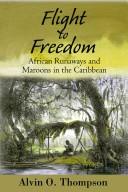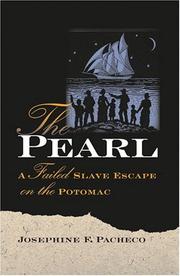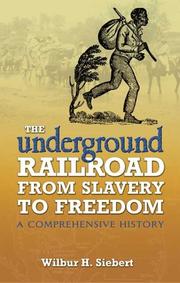| Listing 1 - 10 of 44 | << page >> |
Sort by
|
Book
ISBN: 1683783107 9781683783107 Year: 2016 Publisher: [San Francisco, California] : Instaread,
Abstract | Keywords | Export | Availability | Bookmark
 Loading...
Loading...Choose an application
- Reference Manager
- EndNote
- RefWorks (Direct export to RefWorks)
Fugitive slaves --- Underground Railroad --- Runaway slaves --- Slavery --- Slaves --- Enslaved persons
Book
ISBN: 1469633299 1469633302 9781469633305 9781469633299 9781469633282 1469633280 9798890854414 Year: 2017 Publisher: Chapel Hill University of North Carolina at Chapel Hill Library
Abstract | Keywords | Export | Availability | Bookmark
 Loading...
Loading...Choose an application
- Reference Manager
- EndNote
- RefWorks (Direct export to RefWorks)
Mary Prince's narrative was one of the earliest to reveal the ugly truths about slavery in the West Indies to an English reading public that was largely unaware of its atrocities. Prince was born in Bermuda to an enslaved family. She spent her early life in harsh conditions and was eventually sold to John Adams Wood of Antigua, working as his domestic servant. She joined the Moravian Church, where she learned to read, and married Daniel James, a former slave who had bought his freedom. In 1828 she traveled to England with the Woods family and after protracted efforts by abolitionists was able to leave their control. Encouraged by her new employer, Thomas Pringle, who also served as her editor, Prince wrote and published her book in 1831 to wide acclaim. While eighteenth-century slave narratives largely focused on Christian spiritual journeys and religious redemption, Prince was part of a growing trend of abolitionist writers focused on the injustice of slavery. Her work stands alongside better-known narratives such as A Narrative of the Adventures and Escape of Moses Roper and Narrative of the Life of Frederick Douglass. Adding to its importance, few early women's slave narratives exist.
Slavery --- Fugitive slaves --- Runaway slaves --- Slaves --- Prince, Mary. --- Enslaved persons
Book
ISBN: 146960289X 0807869627 0807869619 9780807869628 9798890843289 9798890843272 Year: 2011 Publisher: Chapel Hill : University of North Carolina Press,
Abstract | Keywords | Export | Availability | Bookmark
 Loading...
Loading...Choose an application
- Reference Manager
- EndNote
- RefWorks (Direct export to RefWorks)
This 1876 version of Josiah Henson's autobiography, the first of many editions issued by British editor John Lobb, followed the original 1849 edition and a much-expanded 1858 version. The autobiography traces Henson's life from his birth into slavery in Maryland in 1789; his escape to Canada in 1830; his participation in the founding of the Dawn Settlement for fugitive slaves in Ontario; and his several trips to England to raise funds for the settlement.
Blacks --- Clergy --- Fugitive slaves --- Runaway slaves --- Slavery --- Negroes --- Henson, Josiah, --- Slaves --- Ethnology --- Black persons --- Black people --- Enslaved persons
Book
ISBN: 0821442147 9780821442142 0821416901 9780821416907 Year: 2006 Publisher: Athens, Ohio Ohio University Press
Abstract | Keywords | Export | Availability | Bookmark
 Loading...
Loading...Choose an application
- Reference Manager
- EndNote
- RefWorks (Direct export to RefWorks)
On March 11, 1854, the people of Wisconsin prevented agents of the federal government from carrying away the fugitive slave, Joshua Glover. Assembling in mass outside the Milwaukee courthouse, they demanded that the federal officers respect his civil liberties as they would those of any other citizen of the state. When the officers refused, the crowd took matters into its own hands and rescued Joshua Glover. The federal government brought his rescuers to trial, but the Wisconsin Supreme Court intervened and took the bold step of ruling the Fugitive Slave Act unconstitutional. The Rescue o
Fugitive slaves --- Runaway slaves --- Slavery --- Slaves --- Legal status, laws, etc. --- History --- Glover, Joshua. --- Booth, Sherman M. --- United States. --- Enslaved persons

ISBN: 1435630882 9781435630888 9789766401801 9766401802 9766401802 Year: 2006 Publisher: Kingston University of West Indies press
Abstract | Keywords | Export | Availability | Bookmark
 Loading...
Loading...Choose an application
- Reference Manager
- EndNote
- RefWorks (Direct export to RefWorks)
Maroons --- Fugitive slaves --- Runaway slaves --- Slavery --- Slaves --- Cimarrones --- Blacks --- History. --- Caribbean Area --- History --- Cimarrónes --- Enslaved persons
Book
ISBN: 1316832260 1107179556 1316843831 1316846075 Year: 2022 Publisher: Cambridge : Cambridge University Press,
Abstract | Keywords | Export | Availability | Bookmark
 Loading...
Loading...Choose an application
- Reference Manager
- EndNote
- RefWorks (Direct export to RefWorks)
In this fascinating book, Damian Alan Pargas introduces a new conceptualization of 'spaces of freedom' for fugitive slaves in North America between 1800 and 1860, and answers the questions: How and why did enslaved people flee to - and navigate - different destinations throughout the continent, and to what extent did they succeed in evading recapture and re-enslavement? Taking a continental approach, this study highlights the diversity of slave fight by conceptually dividing the continent into three distinct - and continuously evolving - spaces of freedom. Namely, spaces of informal freedom in the US South, where enslaved people attempted to flee by passing as free blacks; spaces of semi-formal freedom in the US North, where slavery was abolished but the precise status of fugitive slaves was contested; and spaces of formal freedom in Canada and Mexico, where slavery was abolished and runaways were considered legally free and safe from re-enslavement.
Fugitive slaves --- Slaves --- Maroons --- Fugitive slave communities --- History --- Emancipation --- Communities --- Cimarrónes --- Enslaved persons --- Persons --- Slavery --- Runaway slaves

ISBN: 0807888923 1469604183 1469615002 0807829188 9780807888926 9781469604183 9780807829189 9781469615004 Year: 2005 Publisher: Chapel Hill London
Abstract | Keywords | Export | Availability | Bookmark
 Loading...
Loading...Choose an application
- Reference Manager
- EndNote
- RefWorks (Direct export to RefWorks)
In 1848 seventy-six slaves from the nation's capital hid aboard the schooner Pearl in an attempt to sail to freedom in Pennsylvania. When bad weather forced them to anchor, the slaves and the ship's crew were captured and returned to Washington. This work ranges from the preparations for escape to the participants' trial.
Fugitive slaves --- Antislavery movements --- History --- Pearl (Schooner) --- Runaway slaves --- Slavery --- Abolitionism --- Anti-slavery movements --- Slaves --- Human rights movements --- Fugitive enslaved persons

ISBN: 0486138518 0486450392 Year: 2012 Publisher: Newburyport : Dover Publications,
Abstract | Keywords | Export | Availability | Bookmark
 Loading...
Loading...Choose an application
- Reference Manager
- EndNote
- RefWorks (Direct export to RefWorks)
First published in 1898, this comprehensive history was the first documented survey of a system that helped fugitive slaves escape from areas in the antebellum South to regions as far north as Canada. Comprising fifty years of research, the text includes interviews and excerpts from diaries, letters, biographies, memoirs, speeches, and a large number of other firsthand accounts. Together, they shed much light on the origins of a system that provided aid to runaway slaves, including the degree of formal organization within the movement, methods of procedure, geographical range, leadership roles
Underground Railroad --- Fugitive slaves --- Regions & Countries - Americas --- History & Archaeology --- United States - General --- Runaway slaves --- Slavery --- Slaves --- Antislavery movements --- Fugitive enslaved persons.
Book
ISBN: 128358364X 9786613896094 0252094034 9780252094033 9780252036910 0252036913 6613896098 0252079663 Year: 2012 Publisher: Urbana
Abstract | Keywords | Export | Availability | Bookmark
 Loading...
Loading...Choose an application
- Reference Manager
- EndNote
- RefWorks (Direct export to RefWorks)
This study examines slave resistance and protest in antebellum Florida and its local and national impact from 1821 to 1865. The author discusses Florida's historical significance as a runaway slave haven dating back to the 17th century.
Slaves --- Fugitive slaves --- Slave insurrections --- Enslaved persons --- Persons --- Slavery --- Runaway slaves --- Slave rebellions --- Slave revolts --- Revolutions --- History --- Social conditions --- Insurrections, etc. --- Florida
Book
ISBN: 1583675612 9781583675618 9781583675595 9781583675588 1583675582 1583675590 9781583675595 Year: 2015 Publisher: New York
Abstract | Keywords | Export | Availability | Bookmark
 Loading...
Loading...Choose an application
- Reference Manager
- EndNote
- RefWorks (Direct export to RefWorks)
Trials --- Maroons --- Fugitive slaves --- Runaway slaves --- Slavery --- Slaves --- Cimarrones --- Blacks --- State trials --- Court proceedings --- Procedure (Law) --- History. --- Dominica --- Commonwealth of Dominica --- French Dominica --- Waiʻtu kubuli --- West Indies (Federation) --- Leeward Islands (Federation) --- Windward Islands (Jurisdiction) --- Cimarrónes --- Enslaved persons
| Listing 1 - 10 of 44 | << page >> |
Sort by
|

 Search
Search Feedback
Feedback About UniCat
About UniCat  Help
Help News
News